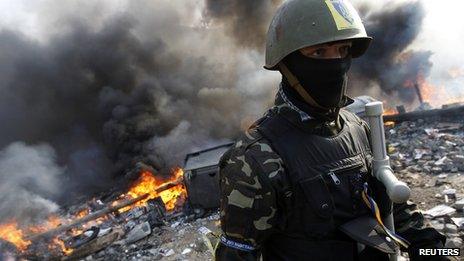Finns on Russian border wary of Nato ties
- Published
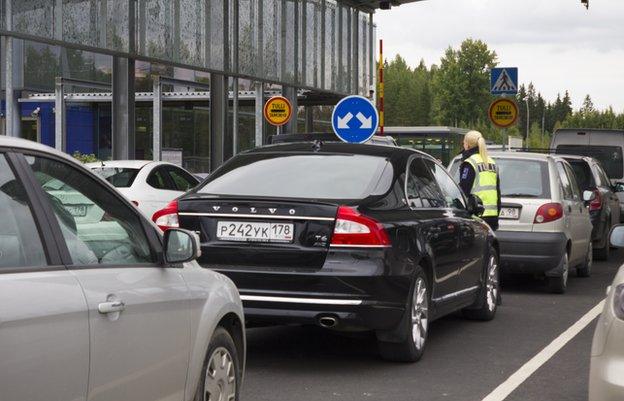
Four thousand Russians come over the border to shop in Lappeenranta every day
Finland is to sign a pact strengthening its ties with Nato on Thursday as the conflict in Ukraine re-awakens old fears about its neighbour Russia. The two countries share a 1,300km (800 mile) border, but while the Finnish prime minister wants to join Nato, a majority of Finns do not appear keen.
On the outskirts of Lappeenranta, 25km from the Russian border, a busload of Russian tourists rush inside a grey warehouse-like supermarket.
Others emerge with bagfuls of shopping that fill the boots of their cars. Here Russians can find the EU food products that the Kremlin has banned.
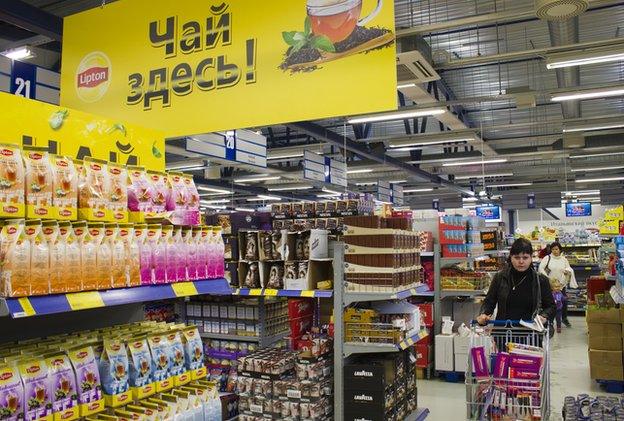
This warehouse-like Finnish supermarket is a magnet for Russian tourists
This slow-paced city of 73,000 people is in Karelia, a beautiful region of lakes and birch forests.
Karelia's present and past illustrate the dilemma facing Finland, a historically neutral country, when weighing up whether to join Nato.
Its very name induces melancholy feelings among Finns after large swathes of the area were taken by Russia after World War Two.
Lappeenranta's fortress, which overlooks the city, was built by the Russians in 1775 following a bloody battle in which hundreds of Finns were killed.
A monument commemorating the battle contains a metre-long log of wood which is said to have floated on a river of blood uphill to the fortress.
"It was a really sad day in our history. These border regions have always suffered during the wars so it is really nice for us to live in years of peace," says Markku Heinonen, who has worked as a development manager for Lappeenranta for almost 30 years.
His task is to attract business to the city, and keep Russian tourists happy is his main priority.
"Two million Russians visited our city last year and they spent 280m euros (£220m; $370m) so they are very important to us."
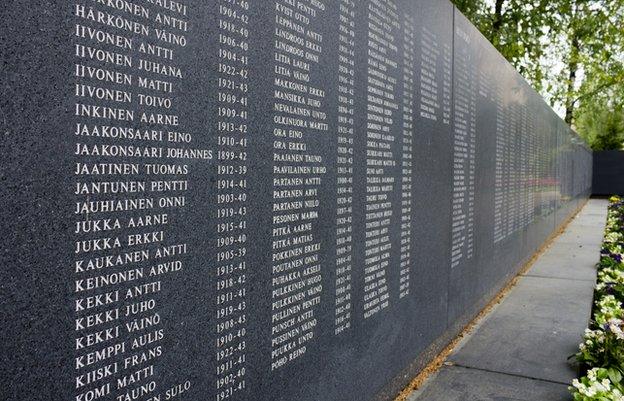
Finland agreed to hand large parts of Karelia to Russia after Soviet troops invaded in the deadly Winter War of 1939-40
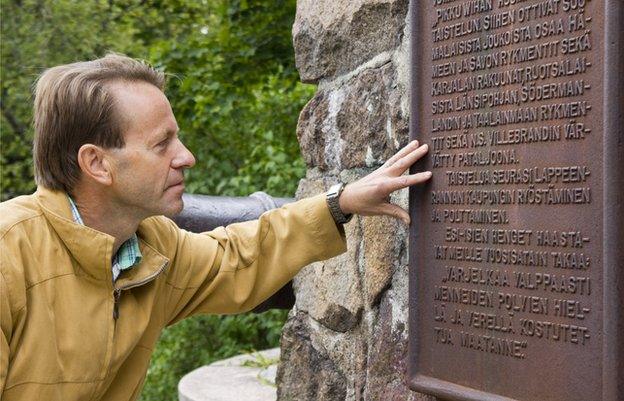
Markku Heinonen looks at the names of those who fell in the 1741 Battle of Lappeenranta
The crisis in Ukraine has brought the question of Nato membership to the fore, but it is a move strongly opposed by Russia.
Earlier this year Finland's recently-appointed Prime Minister, Alexander Stubb, made his position clear: "We have to aim at maximising Finland's national security and being part of decision making, and that happens best as a Nato member."
But opinion polls show that only a quarter of Finland's 5.5 million people agree with him.
At the Nato summit in Wales, Finland and possibly Sweden will sign a host nation support agreement (HNS) that allows assistance from alliance troops in situations such as "disasters, disruptions and threats to security". It will also enable joint training exercises and military co-operation.
'Finnish fish is better than Russian fish'
Four thousand Russians come to Lappeenranta every day for tax-free shopping.
The border crossing is full of people with cars stacked with goods, such as Alexander Pozhidaev, who lives an hour's car journey away in Vyborg.
"I come to Lappeenranta twice a week to buy food because it is much cheaper than in Russia," he says.

Alexander Pozhidaev is one of two million Russians who come to Lappeenranta annually
"Last week I bought sour cream because it is half the price here," he says.
"We don't buy food in Russia," says Anton Kriuchkov, who has driven from St Petersburg with his wife and daughter to do their weekly shopping.
"It is cheaper here and the quality of the products is better. Finnish fish is better than Russian fish."
'Putin cheese'
In the centre of Lappeenranta, Russian tourist buses jostle for space outside the endless array of shopping outlets.
Mayor Kimmo Jarva has a good view of it from his office at City Hall. "We get our living here and our shops are getting better because of money from the Russians, so it's very important."
As might be expected from someone representing a border town, he is reluctant to discuss the issue of Finland's Nato membership. "It is essential for me to remain on good terms with east and west," he says.
"It would be a catastrophe for us if the Russians stopped coming. Unemployment would grow and investment would decrease. We have to keep the Russians happy and we will do that."
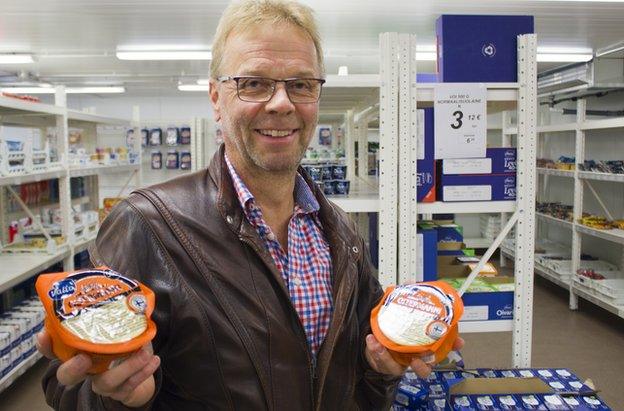
Finns are snapping up "Putin's cheese", banned by Russian sanctions on EU produce
When the EU imposed sanctions on Russia over the Ukraine crisis, the Kremlin responded by banning food imports from European countries.
In Finland this has resulted in a nationwide rush for heavily discounted dairy products that had been bound for Russia. One of Finland's most popular cheeses, with Russian packaging, is now known as "Putin cheese".
Markus Saukkonen, 57, is among the hordes of Finns taking advantage of the situation. "I've bought milk, butter, sour cream and I'm going to take a couple of Putin cheeses. For us it is good while it lasts."
But while Finns are enjoying the benefit of cheaper local produce, many are preoccupied by Russia's intervention in Ukraine and the repercussions it may have for Finland's future security.
Jarno Korhola, a 36-year-old local man, admits he is worried: "You have to be. We live right next to the Russian border."
But what if Finland were to join Nato? "The benefit would be a bigger force to back us up if something really bad happens."
- Published28 August 2014
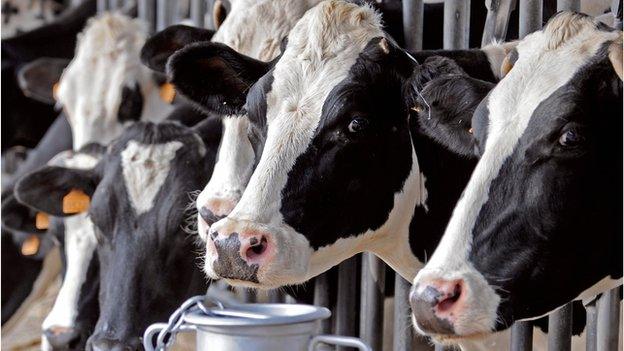
- Published22 August 2014
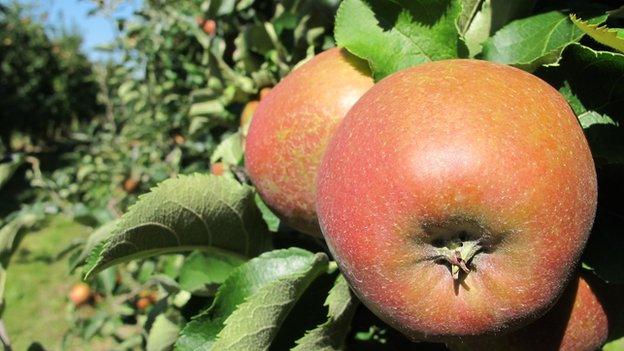
- Published3 September 2014
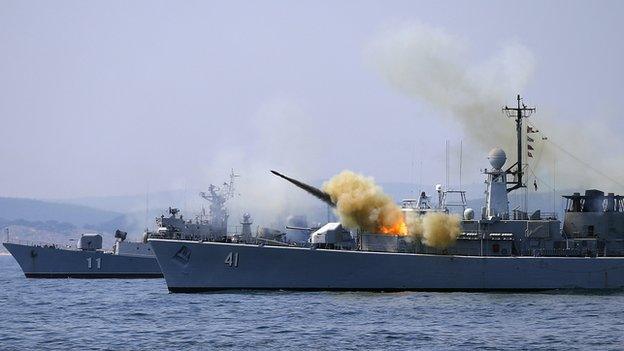
- Published13 November 2014
